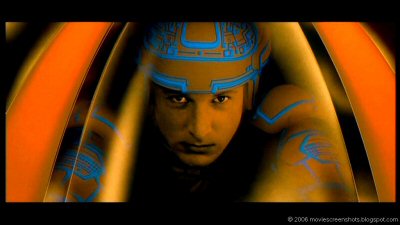
Software designer Daniel Wellman writes about an uncanny experience where a game he was programming seemed to come to life with a will all its own in his essay, “Real Life Tron on Apple IIgs”:
One day, when Marco and I were playing against two computer opponents, we forced one of the AI cycles to trap itself between its own walls and the bottom game border. Sensing an impending crash, it fired a missile, just like it always did whenever it was trapped. But this time was different – instead of firing at another trail, it fired at the game border, which looked like any other light cycle trail as far as the computer was concerned. The missile impacted with the border, leaving a cycle-sized hole, and the computer promptly took the exit and left the main playing field. Puzzled, we watched as the cycle drove through the scoring display at the bottom of the screen. It easily avoided the score digits and then drove off the screen altogether.
Shortly after, the system crashed.
Our minds reeled as we tried to understand what we had just seen. The computer had found a way to get out of the game. When a cycle left the game screen, it escaped into computer memory – just like in the movie.
(Thanks to Dennis Jerz for calling attention to this interesting essay.)
TRON is a silly movie (those outfits!), but “remaking” it across media (i.e., “transmediation”) generates the affect of the uncanny: re-imagining the “light cycles race” from the film as a computer game turns the narrative into a hyper-realized metafiction when testing it. It isn’t that the game was “just like the movie” in the way that it crashed — it is that the experience of the game is “just like” the fantastic experience of the characters in (and the spectator’s phantasy during) the film: the computer seems to have taken control of the very computer the gamer is playing with and, as artificial intelligence, has “come alive” in an autonomous way (by “going off the grid” and choosing to escape the game altogether).
We are the ghost in the machine. That’s the fantasy of Tron. And its lesson.
I enjoyed reading Wellman’s discussion of the joy of repeating this experience and making the somewhat primitive Apple IIG machine itself crash over and over again (because “protected memory” was not a part of computing yet). The compulsion to repeat the spectacular end — is this not a reenactment of the Freudian “death drive” (quite literally driven on light cycles) on the level of machines and artificial intelligence?